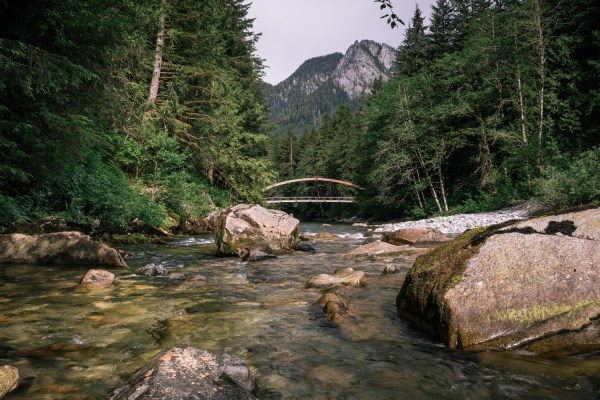Once a haven for hidden meth labs and illegal shooting, the 110,000 acres of the Middle Fork Valley in the Central Cascade Mountains, an hour outside of Seattle, was a place to stay away from.
But after two decades of incredibly hard work by citizens, non-profits, and local governments, the valley—with old growth forests, alpine lakes and peaks, whitewater rivers, native trout runs and healthy populations of bear, elk and cougar—has been returned to its criminal-free natural state. Its upper half is managed by the U.S. Forest Service, while its lower half is under the watch of the state’s Department of Natural Resources; 97% of the land is publicly owned. Trails wind through the valley, architecturally stunning bridges span the crystal clear rivers and picturesque cliffs loom over it all.
The $20 million paving project will significantly open up access to the valley. In light of the crowds expected to arrive when the potholes are finally gone, the Mountains to Sound Greenway Trust, Washington Trails Association, Washington State Department of Natural Resources, and the U.S. Forest Service are working on a series of projects to create a more sustainable recreation area. After the nearby trailhead to popular Mailbox Peak was redone, it saw explosive growth that the redesign didn’t account for. On any given Saturday, 250 cars can be seen lining the roads outside the new parking area, which holds 60 vehicles. The many partners and organizations involved in the re-opening of the Middle Fork Valley are seeing this as a sign of what’s to come.
“The road opening will allow easy access to the valley for the first time in decades, and we expect a dramatic increase in usage of the area will follow,” says Jon Hoekstra, Executive Director of the Mountains to Sound Greenway Trust. “People are going to come out in large numbers, whether the valley is ready or not, so let’s make sure we have the infrastructure to make it sustainable.”
The road contractor is working to lift parts of the road so that people can’t pull off and park anywhere they want, possibly damaging sensitive ecological areas such as wetlands. After a rain, sediment from the dirt road washed into the river, which the newly paved road will help prevent.

The crowning jewel of the valley will be the restored 15-mile Middle Fork Trail, the backbone of the trail network that meanders through the low reaches of the valley along the Middle Fork Snoqualmie River up into the Alpine Lakes Wilderness. Hikers, backpackers, trail runners, mountain bikers and equestrians are welcome on the trail, parts of which are currently in rough shape. Flooding in the past several years has created dangerous conditions: The most heavily used section of the trail is so washed out that hikers and bikers have to scramble along a narrow edge over unstable riverbank that has been undercut by flowing water. Horses are unable to use the trail as is.
The Mountains to Sound Greenway Trust and Washington Trails Association (WTA) will collaborate with the U.S. Forest Service to relocate the trail to stable ground as well as repair rotten wooden boardwalk and create a trail that is safe for everyone. Completion is slated for 2017.
“Exploring a natural place can have a powerful impact on a person’s life,” says Karen Daubert, Executive Director for WTA. “WTA wants to ensure that these experiences are available to everyone—that’s why we’re thrilled to be working with our volunteers and partners in the Middle Fork. Trails close to home are the entry point for a lifetime of outdoor exploration and will inspire new generations to connect with and conserve Washington’s wild places.”
Other projects in the valley include restoration on popular nearby trails and the creation of official trails to alpine gems such as Otter Falls, Lipsy Lake and views of cliffs. A family-friendly day-use area for swimming and boating will be established near the entrance to the valley.
“No other place in the nation offers such boundless wilderness and outdoor recreation so close to a major metro area,” says Hoekstra. “As a community, we’re well on the way to transforming an area that had been essentially lost to garbage dumping and criminal activity into a recreational paradise.”
REI will donate $5.9 million in 2015 to help care for and increase access to more than 1,000 outdoor places in the U.S. Get involved: https://www.rei.com/trails.
